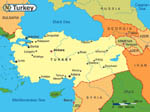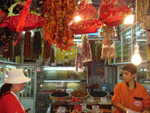|
Editor's
note: Welcome to the Global Health page. The purpose of this feature is
to raise awareness of global health issues with an academic spirit to
help improve the quality of care provided to patients. E-mail
globalhealthnews@musc.edu.
Ali Vural
College of Graduate Studies
The Turkish government has always been primarily responsible for
providing the health care services to its citizens and residents.
Recently, various government-run social protection agencies were
gathered under one umbrella called Social Security Foundation (Sosyal
Guvenlik Kurumu-SGK) and all community hospitals are now under the
Turkish Health Ministry.
 SGK
is the major health care institution, providing free health insurance
to people. How the system works: The employers—either government or
private business owners—have to register their employees to SGK's
database and pay taxes (they are reasonable and not too much) depending
on their employee status. Once the person is in the system, he or she
is provided with a health record document and receives free health
insurance and can get any health service for free regardless of the
health state or financial situation from government hospitals. SGK
is the major health care institution, providing free health insurance
to people. How the system works: The employers—either government or
private business owners—have to register their employees to SGK's
database and pay taxes (they are reasonable and not too much) depending
on their employee status. Once the person is in the system, he or she
is provided with a health record document and receives free health
insurance and can get any health service for free regardless of the
health state or financial situation from government hospitals.
There are both government and privately owned hospitals in Turkey. The
private hospitals having an agreement with the Health Ministry are an
alternative place for the SGK insured people for health services. For
example, you can have major surgery for free, where you have to pay
thousands of dollars here in US. If the hospital does not have the
technological background, then you are sent to one that does.
SGK also takes care of people who are poor, without jobs, by assigning
them what is called a Green Health card for their health care.
Another service provided by SGK is retirement salaries. Once you
retire, the government gives you an allotted monthly sum. In addition,
while you are working, you can choose to give part of your salary,
depending on a plan that you choose, to the government, which will be
redistributed to you in monthly sums when you retire. You are basically
lending money to the government treasury. The idea is to provide a
comfortable life to the senior citizens, in addition to the free health
care.
 Fruits and vegetables are purchased at a local bazaar. Fruits and vegetables are purchased at a local bazaar.
The organization of
Economic Co-Operation and Development (OECD)’s recent Turkish health
care system analysis reported that the health condition of Turkish
society was significantly improved in the last 15-20 years with the
progress in the health care services and the reforms in the health
insurance program. However, there are still some gaps in the quality of
health service and in the number of doctors per patient, particularly
in the Eastern region of the country. To overcome that, new medical
schools are being built to increase the number of doctors; doctors are
having obligatory service in the Eastern region hospitals and new
faculty is recruited to the schools.
Ban on indoor smoking
Turkey has a population of 71 million, where 60 percent of men, 20 percent of women and 11.7 percent of children smoke.
The government officials state that there are 120,000 deaths annually
from smoking-related illnesses. The health care expenses of those
patients have a huge pressure on government’s shoulders.
To overcome this big problem, the government has introduced a two step
smoking ban which has public support. In the first phase, smoking was
prohibited in all facilities of education, entertainment, health and
sports as well as public transportation as of May 19, 2008. It was then
extended to include restaurants, coffeehouses, cafeterias and bars as
of July 19. Patrons violating this ban will be fined $45, while owners
who do not enforce the ban could be fined between $366-$3,660.
Turkey facts
 Turkey is a democratic, secular, constitutional republic with a 99 percent Muslim population. Turkey is a democratic, secular, constitutional republic with a 99 percent Muslim population.
- Anatolia is the
birthplace of historic legends, such as Homer (the poet), King Midas,
Herodotus (the father of history), and St. Paul the Apostle.
- The birthplace of St. Augustine is Antalya, Turkey.
- The first church built by man (St. Peter’s Church) is in Antioch (Antakya), Turkey.
- The oldest known human settlement is in Catalhoyuk, Turkey, the 7th Millenium B.C.
- Turks introduced coffee to Europe.
- The last meal on Noah’s Ark, a pudding of sweet and sour taste (asure) is still served throughout Turkey.
- Turkey is noted for
having one of the three most famous and distinctive traditional
cuisines in the world, the others being Chinese and French.
Announcements
ISA/IA Welcome Back Lunch
Noon - 1 p.m., Sept. 2
Harper Student Center
Harvest Festival USA
6 - 8 p.m., Sept. 22
Redeemer Church
Charleston History Walking Tour
10 a.m. - 1 p.m., Oct. 3
Riverfront Park ~ Pineapple Fountain
English Classes
Intermediate 9:30-10:40 a.m.
Advanced 10:45-11:45 a.m.
Saturdays beginning Sept. 19
HSC Library, SW 224
Medical Spanish Classes
Basic and Advanced
6 - 8 p.m., Tuesdays, Sept. 8 through Oct. 13
Room 102, Colbert Education Center & Library
Visit http://www.musc.edu/international.
Friday, August 28, 2009
|



 SGK
is the major health care institution, providing free health insurance
to people. How the system works: The employers—either government or
private business owners—have to register their employees to SGK's
database and pay taxes (they are reasonable and not too much) depending
on their employee status. Once the person is in the system, he or she
is provided with a health record document and receives free health
insurance and can get any health service for free regardless of the
health state or financial situation from government hospitals.
SGK
is the major health care institution, providing free health insurance
to people. How the system works: The employers—either government or
private business owners—have to register their employees to SGK's
database and pay taxes (they are reasonable and not too much) depending
on their employee status. Once the person is in the system, he or she
is provided with a health record document and receives free health
insurance and can get any health service for free regardless of the
health state or financial situation from government hospitals.  Fruits and vegetables are purchased at a local bazaar.
Fruits and vegetables are purchased at a local bazaar. 